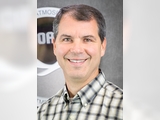GESTAR II Seminar Series, March 31 at 10:00am
Join us for a virtual seminar by Dr. David Turner, NOAA. At NOAA, he is Lead, Model Assessment Section, Assimilation Development Branch, and Manager, NOAA Atmospheric Science for Renewable Energy (ASRE) Program. His talk is titled "Retrieving geophysical parameters from passive remote sensors: What we all should know."
Date and Time: Friday, March 31, 2023 at 10:00am
Join us via Teams.
Note: This will be a virtual seminar with the opportunity to meet with Dr. Turner after the talk in the Physics Building, Room 401 on the UMBC campus.
Abstract:
Remote sensing instruments are heavily used to provide observations for both the operational and research communities. These sensors do not provide direct observations of the desired atmospheric variables, but instead, retrieval algorithms are necessary to convert the indirect observations into the variable of interest. This seminar will discuss the underlying assumptions made by many retrieval algorithms, and the various sources of uncertainty that need to be treated properly. The problem is often complicated by imperfect forward models, imperfect prior knowledge, and by the existence of non unique solutions. I'll demonstrate that Optimal Estimation (OE), which is a widely used Bayesian retrieval method that combines measurements, prior information, and the corresponding uncertainties, provides a solution of the atmospheric state with a full characterization of the uncertainty of the retrieval.
Biography:
Dr. David Turner received his BA and MS in mathematics at Eastern Washington University, and his PhD in atmospheric science at the University of Wisconsin - Madison. He worked as a scientist at a DOE National Lab and as a professor at the University of Wisconsin before joining NOAA. Dr. Turner's research interests include improving radiative transfer models, remote sensing with active and passive sensors, retrieval theory, studying the thermodynamic and dynamic structure of the boundary layer and its evolution, and using observations to improve operational weather prediction models.
For more information on the GESTAR II Seminar Series, click here.
Tags:
Posted: March 27, 2023, 10:43 AM
